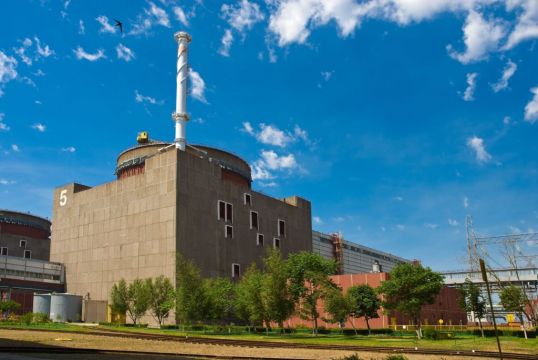The head of the UN nuclear watchdog met officials from Russia’s military and state atomic energy company in Moscow on Thursday as he pursues a long-running drive to set up a protection zone around a Russian-occupied nuclear power plant in Ukraine.
Russian company Rosatom described the talks on measures needed to safeguard Ukraine’s Zaporizhzhia nuclear power plant and the surrounding area as “substantive, useful and frank”.
International Atomic Energy Agency director-general Rafael Grossi indicated that more negotiations are needed after “another round of necessary discussions”.
“It’s key that the zone focuses solely on preventing a nuclear accident,” he tweeted. “I am continuing my efforts towards this goal with a sense of utmost urgency.”
Another round of necessary discussions on the creation of a protection zone for the #Zaporizhzhya Nuclear Power Plant. It’s key that the zone focuses solely on preventing a nuclear accident. I am continuing my efforts towards this goal with a sense of utmost urgency. pic.twitter.com/TUzzhZhtDW
Advertisement— Rafael MarianoGrossi (@rafaelmgrossi) December 22, 2022
The meeting in Moscow came a day after Ukrainian President Volodymyr Zelensky made a defiant wartime visit to the US capital, his first known trip outside his country in the nearly 10 months since Russia invaded.
The visit to Washington was aimed at reinvigorating support for Ukraine in the US and around the world at a time when Russia appears to have lost battlefield momentum.
There is concern that Ukraine’s allies are growing weary of providing the military and economic assistance that have enabled Ukraine to keep fighting.
The Russian military reported on Thursday that Defence Minister Sergei Shoigu paid a visit to Russian troops on the front line of what the Kremlin calls its “special military operation” in Ukraine. The exact location of the visit was not disclosed.
A video released by the Russian Defence Ministry showed Mr Shoigu inspecting temporary troop quarters in dugouts and talking to military commanders.
Before his trip to Washington, Mr Zelensky met with Ukrainian troops in the eastern city of Bakhmut, the recent focus of some of the war’s most intense combat.
Russian President Vladimir Putin has never been seen travelling to frontline areas. Russian newspaper Rossiyskaya Gazeta reported that he visited his Ukraine command headquarters last week, but its location was not disclosed, and it was not even clear if it was in Ukraine.
The IAEA’s Mr Grossi has been urging Russia and Ukraine for more than three months to agree on a safety zone around Europe’s largest nuclear power station.
Zaporizhizia province and areas across the Dnieper River from the nuclear power plant have been under regular shelling since Russia invaded Ukraine on February 24.
Ukrainian officials have repeatedly called for a demilitarised zone around the plant, which was seized by Russian forces early in the war.
Although all six of the plant’s reactors have been shut down, the reactor core and used nuclear fuel must still be cooled for lengthy periods to prevent them overheating and triggering dangerous meltdowns like the ones that occurred in 2011 when a tsunami hit the Fukushima plant in Japan. Ukraine saw the world’s worst nuclear accident, at Chernobyl in 1986.
My statement on the situation and recent developments at nuclear power plants in #Ukraine, part 1 of 2. pic.twitter.com/nVD4yYQZEA
— Rafael MarianoGrossi (@rafaelmgrossi) November 24, 2022
Ukraine and Russia have blamed each other for the repeated shelling, which has led on multiple occasions to the Zaporizhizia plant losing the electricity needed to operate the cooling system.
Earlier this month, Ukrainian officials also accused Russian troops of installing multiple rocket launchers at the site.
Mr Grossi said in November that the main issues under discussion involve military equipment and the radius of the safety zone.
He said the IAEA’s proposal is very simple: “Don’t shoot at the plant, don’t shoot from the plant.”







